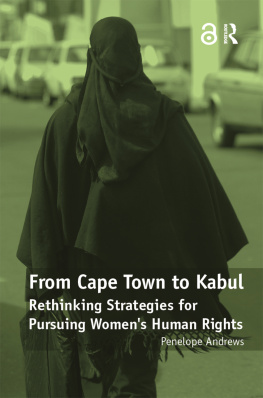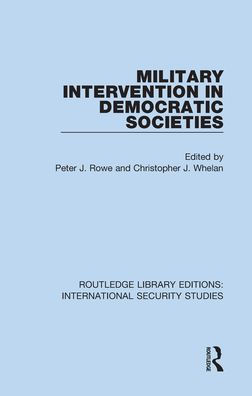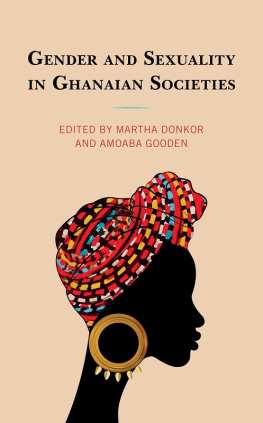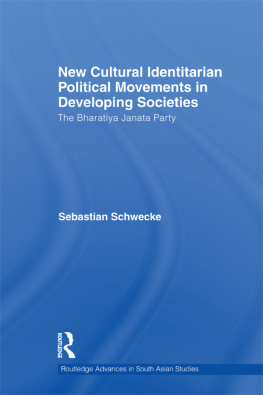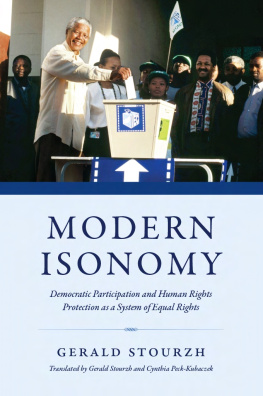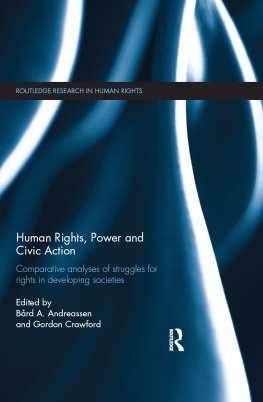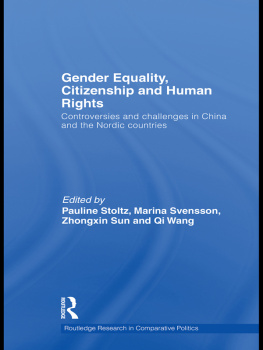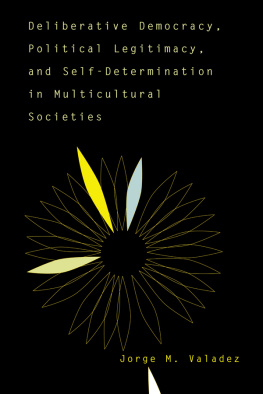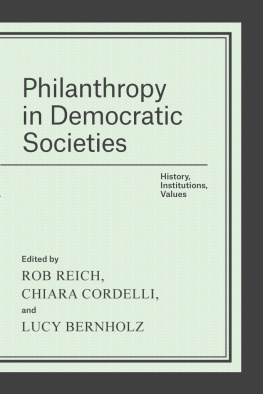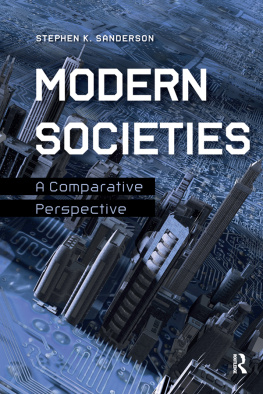FROM CAPE TOWN TO KABUL
This book is written with passion for and deep experience of struggles for womens rights in different parts of the globe. Professor Andrews deals with the vexed issue of the role of local cultures in defining womens rights in both South Africa and Afghanistan. She departs from the traditional western feminist goal of autonomy for women and argues instead for recognition of womens conditional interdependence. This book is bold and insightful, a rich comparative analysis, with a transformational purpose.
Hilary Charlesworth, The Australian National University, Australia
In this fascinating read, the author addresses the critical complexities of womens rights in transitional societies. Developing the intriguing concept of conditional interdependence, she challenges feminist conceptualizations based primarily on personal autonomy. Whether in her native South Africa or Afghanistan, progress occurs only with the support of the community of women AND men.
Adrien K. Wing, University of Iowa College of Law, USA
From Cape Town to Kabul
Rethinking Strategies for Pursuing Womens Human Rights
PENELOPE ANDREWS
Albany Law School, USA
First published 2012 by Ashgate Publishing
Published 2016 by Routledge
2 Park Square, Milton Park, Abingdon, Oxon OX14 4RN
711 Third Avenue, New York, NY 10017, USA
Routledge is an imprint of the Taylor & Francis Group, an informa business
Copyright 2012 Penelope Andrews
Penelope Andrews has asserted her right under the Copyright, Designs and Patents Act, 1988, to be identified as the author of this work.
The Open Access version of this book, available at www.taylorfrancis.com, has been made available under a Creative Commons Attribution-Non Commercial-No Derivatives 4.0 license.
Notice:
Product or corporate names may be trademarks or registered trademarks, and are used only for identification and explanation without intent to infringe.
British Library Cataloguing in Publication Data
Andrews, Penelope.
From Cape Town to Kabul : rethinking strategies for pursuing womens human rights.
1. Womens rightsAfghanistan. 2. Womens rightsSouth Africa. 3. Women and democracyAfghanistan. 4. Women and democracySouth Africa.
I. Title
323.3409581-dc23
Library of Congress Cataloging-in-Publication Data
Andrews, Penelope.
From Cape Town to Kabul : rethinking strategies for pursuing womens human rights / by Penelope Andrews.
p. cm.
Includes bibliographical references and index.
ISBN 978-0-7546-7996-7 (hardback : alk. paper)
1. Womens rightsSouth Africa. 2. Womens rightsAfghanistan. 3. Sex discrimination against womenLaw and legislationSouth Africa. 4. Sex discrimination against womenLaw and legislationAfghanistan. I. Title.
K3243.A95 2012
323.34dc23
2012019358
ISBN 9780754679967 (hbk)
Contents
Writing this book has been a labor of love. The title of the book and its thesis stemmed from my years of advocacy, teaching and scholarship about womens rights, particularly the rights of black South African women and indigenous Australian women. The kernel of the book first took shape in 2004 when I was a visiting scholar at the Rockefeller Center in Bellagio, Italy, surely one of the most spectacular and peaceful places on earth. Any scholar deserves some time in Bellagio!
It is therefore fitting that my first note of thanks goes to the Rockefeller Foundation, for creating the conditions for me to pursue the writing of this book. I had initially hoped that the manuscript would be completed within a year or two after my stint in Bellagio but various projects precluded this from transpiring. First, I took up a visiting position as the Ariel Sallows Professor of Law and Democracy at the University of Saskatchewan in Saskatoon, Canada, a jewel of a place, albeit somewhat frozen for many months of the year. Over the course of that year I acquired many friends and the time I spent there was very special. I taught a course at the law school on comparative human rights, and organized two conferences: one at the University of Saskatchewan and other at the University of KwaZulu-Natal. The proceedings of the latter conference were published in a volume that I co-edited with Susan Bazilli entitled, Law and Rights: Global Perspectives on Constitutionalism and Governance.
In 2007 I left New York and moved to Valparaiso, Indiana, first as a visiting professor at Valparaiso University School of Law, and later joining the faculty on a permanent basis. My years at Valparaiso were wonderful and many on the faculty there became good friends. At Valparaiso I organized a series of conferences. Between 2008 and 2010 I held a joint appointment with Valparaiso and La Trobe University in Melbourne, Australia, tripling my airline mileage but depleting my reserves of energy.
I returned to CUNY School of Law as the Associate Dean for Academic Affairs in 2010. As I submit this manuscript I have just commenced my term as the first female President and Dean of Albany Law School in the capital of New York state.
In addition to thanking the Rockefeller Foundation, several people have to be thanked. First, my support staff at the CUNY School of Law, including Angela Morrison, Maryann Ruggiero, Lisa Smith, and Cathy Larsen. A special thanks also goes to Vicki Hickey. I also thank my research assistants, Margaret Palmer CUNY Class of 2012, Prathiba Desai CUNY Class of 2012, and Rachel Sazanowicz CUNY Class of 2014, all young women who make CUNY School of Law proud, and who will in time become excellent public interest lawyers. Part of this manuscript was presented over the years at several law schools, including the University of Nebraska (courtesy of Professor Anna Shavers), the Australian National University School of Law (courtesy of Professor Hilary Charlesworth) and the Washington and Lee School of Law (courtesy of Professor Blake Morant now Dean at Wake Forest School of Law). I am indebted to them for hosting me and enabling me to engage with their intellectual communities.
My gratitude and thanks go to the following individuals: Professor Taunya Banks, a wonderful friend and friendly critic, Ms. Susan Bazilli, who tirelessly and fearlessly advances the rights or women, Professor Heinz Klug, a loving friend, who inspires, Professor Janet Calvo, the most generous and gracious teacher and host and Professor Andrea McArdle, a creative and thoughtful scholar and friend. They have read and commented on versions of this manuscript. A very special thank you is owed to Mr. Napoleon Williams, whose friendship, guidance and support has been a source of joy. He studied the first drafts of many chapters and gave me the benefit of his knowledge and helpful criticisms. I thank the members of the South Africa Reading Group, especially my co-host, Professor Stephen Ellmann, and the members of that group, who in the past two decades have ensured that the legal, constitutional and political project in South Africa remains of interest to Americans. Our regular gatherings are a source of great inspiration and intellectual camaraderie.
My friends and colleagues at CUNY School of Law deserve special mention. They have created the space for me to develop as a teacher, scholar and human rights advocate For that I am grateful. For those whom I have not mentioned individually, I hope that I have honored you by citing your scholarship and its influence on my work. I also thank my sisters, Wendy and Colleen, and my brother Keith, for their love.

